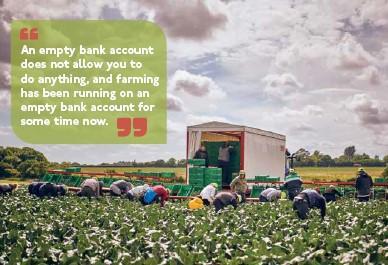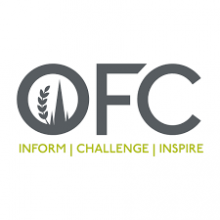Can broken food supply chains be fixed asks Oxford Farming Conference report.
- Recent global and climatic events have exposed supply chain weaknesses and empty farming bank accounts.
- Risk versus reward imbalance is forcing farmers out of production, retailers need to share the risk.
- Farmers’ accounting and negotiating skills need improvement.
- Retailer practices need to change – long term trade agreements, inexperienced buyers and burdensome audits deleteriously affect suppliers’ profit and partnerships.
A report launched today at the 2024 Oxford Farming Conference (OFC) firmly states that the practice of farmers subsidising consumers’ appetite for cheap food cannot continue. After years of ‘permacrisis’ fuelled by Brexit, the Ukrainian conflict, the Covid-19 pandemic and inflation running up to 20%, farming’s confidence and bank balances are at an all-time, unsustainable, low, says the report’s author, Ged Futter.
The report – Is the UK Food Supply Chain Broken? – is based on over 40 interviews with business owners across fresh produce, eggs, poultry, pork, importers, frozen food manufacturers and various consultants. It is kindly sponsored by Horwich Farrelly.
Ged, who has over 30 years of experience in the retail sector, including as a senior buyer in the world’s largest grocery retail company said: “Recent events have acted as catalysts that have exposed pre-existing and fundamental weaknesses in the supply chain. The level of risk is at all-time high, there is consistent oversupply, and coupled with this, a deep understanding of a farm’s cost of production and its profitability is often lacking.
“Widely, retailers get a bad press but, as I was told on a number of occasions, ‘The most sustainable and efficient distribution model is retail to consumer’ and that the UK has probably the highest standards of production in the world, the further you move away from the UK the lower those standards can become and the bigger the food safety risk, as well as the food security risk.”
Crucially, years of warnings that end-market uncertainty and insufficient returns are now having a real and detrimental impact on future UK food production. Ged added: “For some, it seems that it is the end of the road: glasshouses are being closed and orchards are being grubbed. Increasingly, farmers are leaving the sector and using the land for non-agricultural uses because they simply cannot afford to continue subsidising the cheap food that the UK consumer has been used to.”
He said that risk versus reward came up consistently for farmers and growers, “the risk v reward ratio is now out of kilter, more farmers are asking is it worth doing? For example, an apple farmer front loads production, for seven years, from planting trees to full harvest. The cycle that most top fruit buyers work on in the UK is a season, often less than a year. This has considerable implications for growers who must rely on capital once their cash business becomes unsustainable.”
Ged highlights a crucial point on farmers’ accounting practices, in some cases they need markedly more rigour “in my interviews I heard ‘growers are not great at looking at their numbers’; ‘it’s a classic case of shoe box accounting, one for cheques and another for receipts’. Or that, profit or loss for the year would be discovered once the accountant works their ‘magic’ or when the money ran out.”
The report centres on three retailer tactics that need addressing, fixed price, long term agreements, the impact of inexperienced buyers and the audit burden. Ged said that these three issues, over the past 10 years, have squeezed every drop of profit from many of their suppliers.
As for retailer behaviours, some of the insights were stark – very inexperienced and arrogant buyers, limited or no acknowledgment or recompense for a farmer’s risk and multiple, intrusive audits – in one business, an audit was conducted in 42 weeks of the year.
Ged explained the impact of a loss of trust and retailers’ intransigence on agreements; “retailers would rather have empty shelves than break these deals. One industry expert explained how trust has been eroded between the farming sector and retailers. The analogy used was that ‘The current negotiation landscape is the equivalent of Premier League footballers playing against a pub team that complains when they lose 38-0 that the other team didn’t play fair!’ The retailers have become more sophisticated at finding ways of getting better prices and most farmers / growers / packers have not kept up.
“In some categories (mainly produce), the way that retailers and their grower suppliers do business has fundamentally changed from a trading model, based on short, often weekly prices, based on supply and demand, to long-term fixed price contracts. At their worst these contracts can straddle more than one growing season. I heard from growers and farmers in multiple sectors just how destructive this model has been.”
The OFC Director responsible for the report is Ali Capper, an apple and hop grower, she said: “The new business landscape of today’s supply chains with volatility created by geopolitical challenges, unprecedented inflation, increased interest rates, climate change and the cost-of-living crisis require everyone responsible for feeding UK consumers to re-think their approach to supply chains before it is too late. The costs of production for fruit and veg growing has increased by between 20-27% depending on the enterprise. That’s simply unsustainable.
“The 2024 OFC report builds on the Conference’s 2023 report which pointedly called for fairness, net zero cost-sharing and the recalibration of value-sharing throughout the UK’s food supply chain. Its author, Forum for the Future, added that failure to achieve a shared, end-to-end responsibility from farm to consumer would put into jeopardy the food sector’s ability to enable an ecologically safe, sufficient and socially just future for UK food.”
Download the full report below.
About the report’s author
Ged Futter for researching and writing this report. Ged has over three decades of experience in the retail sector, 15 years of which were as a senior buyer in the world’s largest grocery retail company. Ged commentates regularly on all things retail for the BBC, 5Live, The Grocer, The Guardian and The Times. His expertise is in retail behaviour with an insider’s understanding of buyer priorities, strategies and the rules they are supposed to follow. His consultancy business works with supermarket suppliers to provide deep insights into supermarket retailer behaviours and to deepen their understanding of the protections afforded by the Grocery Supply Code of Practice (GSCOP) which is enforced by the Grocer Code Adjudicator - the UK Government’s independent regulator.



